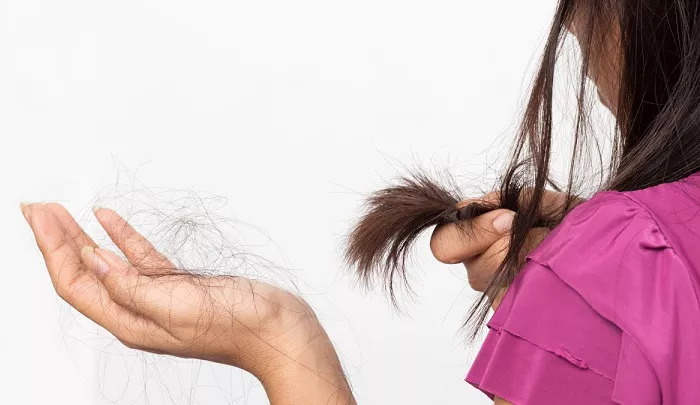Pregnancy can be a wonderful time in a woman’s life, but it can also bring about many changes to the body, including changes to the hair. Many women experience hair loss or thinning hair after pregnancy, which can be a source of stress and anxiety. In this article, we will discuss the causes of postpartum hair loss and whether or not your hair will grow back after pregnancy.
What is Postpartum Hair Loss?
Postpartum hair loss, also known as postpartum alopecia or telogen effluvium, is a temporary hair loss condition that affects many women after giving birth. It is characterized by excessive hair shedding, which can result in thinning hair or bald patches. Postpartum hair loss typically occurs between 3-6 months after giving birth, but can also occur up to a year after delivery. The condition is caused by hormonal changes in the body, specifically a decrease in estrogen levels after pregnancy. This decrease in estrogen can cause the hair follicles to enter a resting phase, leading to increased hair shedding. While postpartum hair loss can be distressing for many women, the good news is that it is usually temporary and the hair will grow back on its own.
What Causes Postpartum Hair Loss?
Postpartum hair loss, also known as postpartum alopecia or telogen effluvium, is a temporary hair loss condition that affects many women after giving birth. It occurs due to hormonal changes in the body, specifically a decrease in estrogen levels after pregnancy. Here are some of the factors that contribute to postpartum hair loss:
Hormonal Changes:
During pregnancy, the body produces higher levels of estrogen, which can cause the hair to remain in the growth phase for longer. This results in thicker, fuller hair during pregnancy. However, after giving birth, estrogen levels drop significantly, causing the hair to enter the resting phase and fall out more than usual.
Stress:
Giving birth and taking care of a newborn can be stressful, which can contribute to postpartum hair loss. High levels of stress can disrupt the hair growth cycle and cause the hair to enter the resting phase prematurely.
Nutritional Deficiencies:
Nutritional deficiencies, particularly of iron and biotin, can contribute to postpartum hair loss. Iron is essential for healthy hair growth, as it helps transport oxygen to the hair follicles. Biotin is important for the production of keratin, a protein that makes up hair.
Genetics:
Some women may be more prone to postpartum hair loss due to genetic factors. If other women in your family have experienced postpartum hair loss, you may be more likely to experience it as well.
Medical Conditions:
Certain medical conditions, such as thyroid disorders or autoimmune diseases, can contribute to postpartum hair loss. If you have a medical condition that affects your hair or hormone levels, you may be more likely to experience postpartum hair loss.
When Will My Hair Grow Back After Pregnancy?
The good news is that postpartum hair loss is usually temporary and the hair will grow back on its own. It may take several months for the hair to return to its pre-pregnancy thickness, but most women will see improvement within 6-12 months after giving birth. It’s important to remember that everyone’s hair growth timeline is different, and some women may experience faster or slower hair growth than others.
How Can I Help My Hair Grow Back After Pregnancy?
While postpartum hair loss is a natural process, there are several things you can do to help your hair grow back after pregnancy. Here are some tips to promote healthy hair growth:
Eat a Balanced Diet:
Eating a balanced diet that is rich in vitamins and minerals is important for healthy hair growth. Focus on foods that are high in iron, biotin, vitamin D, and omega-3 fatty acids. Some examples include leafy greens, eggs, salmon, and nuts.
Take a Hair Growth Supplement:
Taking a hair growth supplement that contains vitamins and minerals that are important for healthy hair growth can also be helpful. Look for supplements that contain biotin, iron, and vitamin D.
Avoid Tight Hairstyles:
Avoid hairstyles that pull on the hair, like tight braids or ponytails. These hairstyles can cause further hair loss and damage to the hair follicles.
Use Gentle Hair Care Products:
Use gentle hair care products that are free of harsh chemicals and sulfates, which can damage the hair and scalp. Look for products that are specifically designed for postpartum hair loss or that are labeled as “gentle” or “sulfate-free.”
Massage Your Scalp:
Massaging the scalp can help improve blood circulation and stimulate hair growth. Use your fingertips to massage your scalp in circular motions for a few minutes each day.
Consider a Haircut:
If your hair is thinning or you have bald patches, consider getting a haircut to help make the hair appear fuller. A shorter haircut can also be easier to manage and style.
Be Patient:
Remember that postpartum hair loss is a natural process, and it may take several months for your hair to grow back to its pre-pregnancy thickness. Be patient and continue to take care of your hair and scalp.
Conclusion
Postpartum hair loss is a common condition that affects many women after pregnancy. While it can be distressing, the good news is that it is usually temporary and the hair will grow back on its own. It’s important to take care of your hair and scalp during this time by eating a balanced diet, using gentle hair care products, and avoiding hairstyles that pull on the hair. If you are concerned about your postpartum hair loss, it’s important to speak with your doctor or a qualified healthcare professional to determine the underlying cause and develop a personalized treatment plan.
Related Topics:

